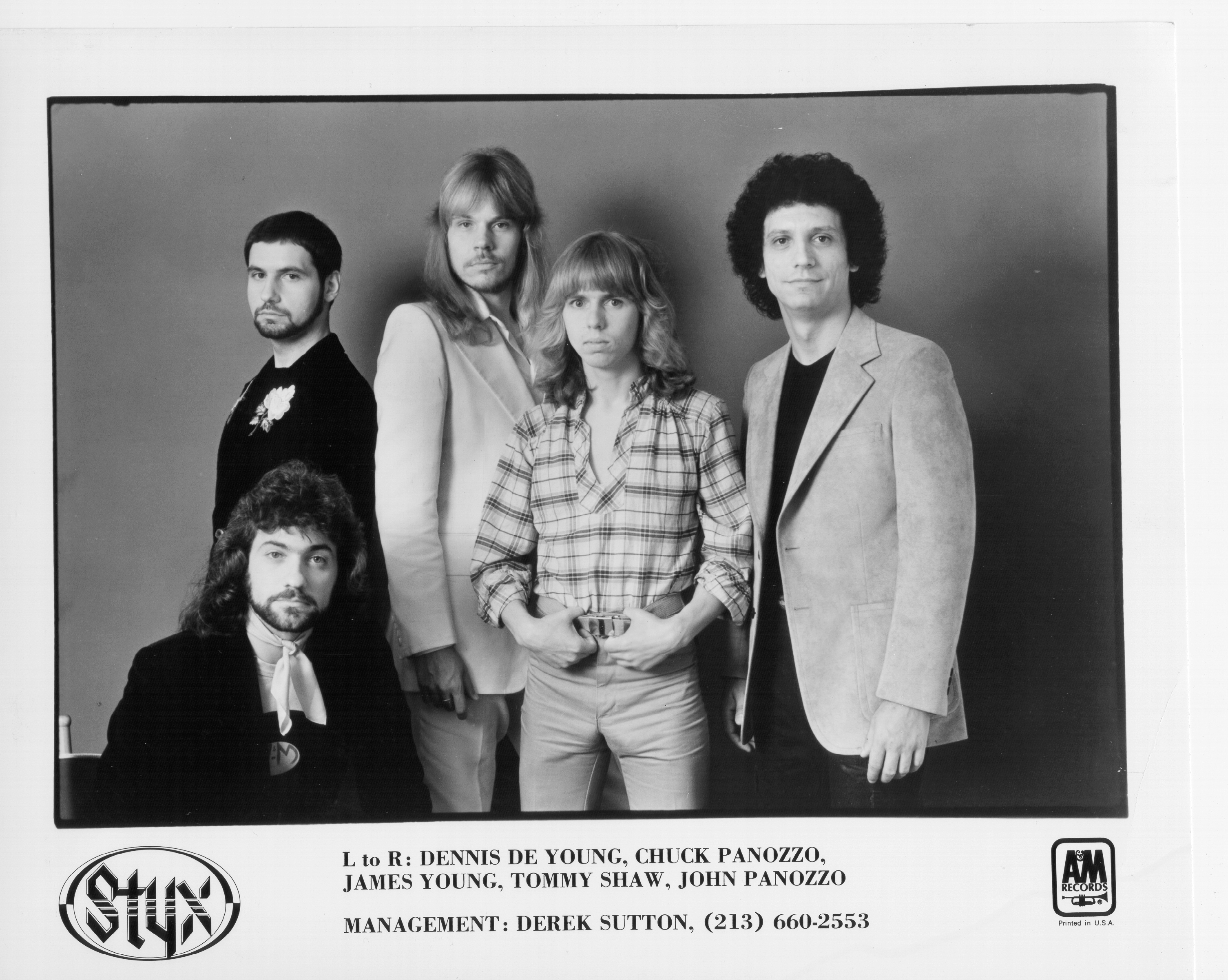It’s a strange world that we live in and in the world of Styx it was even weirder. AOR Magazine managed to speak with three of the band for this feature, and found it heart-warming to wallow in the respect and admiration all of them have for each other’s contributions to their music, even after many years of acrimony.
That’s not to say all is sweetness and light in the Styx camp but what is interesting is that, in the cold light of day, they all acknowledge that the sum of their parts made a truly great noise; a band where everyone played a positive part. Yes, it’s hard to believe that a band with so much success can so quickly become so unglued.
Former Styx front man Dennis DeYoung is on the line. Sounding larger than life and brandishing a supersonic fanfaronade of enthusiasm, he is keen to set some records straight…
“You see, the thing about Styx was that we were a very good-humoured band,” he reveals, much to our amazement. “And another misconception is that we went at each other hammer and tongs. I don’t even think there was any underlying anger or any passive-aggressive feelings. I really don’t believe that. If that were the case, then those with the biggest fists would be the only survivors. The original premise was to get together and create something collectively, so when I hear nonsensical accusations about fighting each other it doesn’t make sense. Sure, there were creative differences, but how can there not be? That fact that rock bands stay together for as long as they do is a miracle.”
James ‘JY’ Young is also philosophical about those years. “It’s said that great works of art come from creative tension, conflict or troubled times. The fact that Dennis, Tommy and I were headed in different directions worked well, leading to songs of an incredibly high standard. In hindsight, the spirit of that thing worked, and there was a magic about that collective of people at that point in our lives.”
For now, however, let’s ignore the finger-pointing and get stuck into a little prehistory – a recapitulation, if you will, of the early (but not necessarily dark) days.
You can trace the formation of Styx back to the early 1960s and its rhythm section, brothers Chuck (bass) and John (drums, who sadly died in 1996) Panozzo, two mad-keen music fans from the Chicago suburbs who started a garage band called The Tradewinds. With the addition of keyboardist Dennis DeYoung, they subsequently switched moniker to the more streamlined TW4, and later that decade added guitarists John Curulewski and James ‘JY’ Young.
Building a reputation as a hot live band, they signed to local Chicago label, Wooden Nickel Records, partly owned by renowned media mogul and concert promoter Jerry Weintraub. The label insisted on a new name and, following exhaustive discussion, they refashioned themselves as Styx, chosen only because none of them hated it.
In total they recorded four albums for Wooden Nickel, all broadly progressive rock with elements of hard rock and a few sappy ballads thrown in for good measure. Indeed, as a precursor to later recordings, 1973’s The Serpent Is Rising was thought to be vaguely conceptual, hinting at a style they would bring fully into focus further down the line. Incredibly, however, two years after its original release in 1973, the album Styx II featured a track titled Lady, which emerged as a regional and then national hit single, reaching the dizzy heights of No.6 on the Billboard chart.

It was this success after years of struggle that finally prompted the band to look for a more influential record label. Wooden Nickel was awash with problems; not least of all restrictive studio budgets and, perhaps most damning, a management clause in the contract. Despite an attempt by RCA (Wooden Nickel’s distribution company) to then secure the band’s signature, it was growing independent label A&M that eventually signed them. It was also A&M who introduced them to their new manager, Derek Sutton, an Englishman who had previously worked with a number of quality acts, including Robin Trower.
With a new label, money and freedom they set about recording Equinox, an album that would herald a more focussed and perhaps more commercial approach. Issued in 1975, and engineered by long term studio cohort Barry Mraz, the album was heralded as a fine statement of intent. It was also housed in one of the most striking album sleeves of the period: a flaming block of ice set in a surreal beach scene underneath an angry green sky.
This unique image somehow identified a few key elements of the emerging Styx sound, suggesting JY’s aspirations as a hard rocker (which later became his brand identity), ably demonstrated by the taut guitar riff of Midnight Ride, along with Dennis DeYoung’s adventurous prog rock ambitions, best exemplified by Suite Madame Blue and Lonely Child, a deceptive combination of ballad and brawn. To cap it all, the band scored another Top 30 US hit with Lorelei. But while they had everything to play for and nothing to lose, they suffered a setback when guitarist John Curulewski (who sadly passed away from a brain aneurysm in 1988) left the band almost immediately after the recording sessions, on the eve of an impending tour.
The hunt was on to find a suitable replacement; not an easy job considering the demanding skill set required, and the fact that a tour was looming. Fortunately, Styx soon found their man in Tommy Shaw, a seasoned but previously unknown guitarist/songwriter who had played in a local Chicago band with the unlikely handle of MSFunk. Although they recognised Tommy as a great guitarist/ vocalist and a dynamic performer, they weren’t aware of his song writing ability. But once this became apparent, the rest of the band felt like they had won the lottery.
Debuting on 1976’s wonderfully crafted Crystal Ball album, Tommy’s impact was felt immediately, having penned the title track and contributed to several other key moments. The album remains one of Styx’s most impressive statements, picking up the pomp rock baton from Equinox and crafting an even more concise and flamboyant opus.
At the heart of the process was their ability to fuse traditional British progressive rock with all-singing, all-dancing American razzle-dazzle. Again, JY was let loose, with the taut, straight-to-the-point shock rock of Nu Shooz, while Clair de Lune/Ballerina showcased Dennis DeYoung’s burgeoning theatricality and was, for many, the high water mark of the album. Tommy Shaw, meanwhile, scored a big coup: not only did he co-write and sing lead vocal on Mademoiselle, the album’s lead single, but it also became the album’s only hit, cementing his position in Styx.
Behind the scenes, however, Dennis DeYoung was – even at this early juncture – feeling the pressures of being part of an in-demand rock band. He began to feel that his life – and to a degree his destiny – was being ruled by Styx, and not the other way around. This wave of despondency would last for some time, but would also go on to fuel some of his, and the band’s, greatest work, their next two albums, starting with 1977’s The Grand Illusion.

“Effectively, I think the band really started to coalesce with the Equinox album,” confides Dennis. “Then, when Tommy came in, it really started to get interesting The Grand Illusion was just another step that found favour in a much bigger way.”
Dennis sings us some lyrics from the title track: “‘Someday soon we’ll stop to ponder what on Earth’s this spell we’re under/We made the grade and still we wonder who the hell we are.’ That is the theme that goes throughout my writing.”
And it wasn’t just Dennis who was feeling a sense of unease with new found fame and wealth.
Tommy Shaw: “Much of The Grand Illusion album was to do with the disillusionment of finding out that the things we had all dreamed about weren’t quite what they were cut out to be.”
Recorded once again in Chicago at Paragon Studios, with Barry Mraz engineering, The Grand Illusion was a masterpiece of pomposity. It was, to that point, the culmination of Styx’s entire career, a record shoe-horned full of songs that have stood the test of time, propelling the band into the superstar league. Indeed, to this day fans feverishly debate whether The Grand Illusion or Pieces Of Eight is the group’s superior release, a topic dividing them into roughly equal constituencies.
Of course, such petty squabbling misses the point that we have two great works to enjoy, both of which being the finest examples of what pomp rock has allowed us sinners to enjoy.
Themed certainly, but not truly a concept album, The Grand Illusion was informed by Dennis’s aforementioned concerns about life in the fast lane and all the pressure that was bearing down on him. He was not alone either. Other members of the band were also noticing unwelcome demands with fame and fortune. Classic songs such as Come Sail Away, Castle Walls and the title track revealed the group absorbed in self-doubt over what they were experiencing. Even mad axeman JY chipped in with a fine slice of acerbic observation in the riff-hungry Miss America, a song that shakes a firm fist at the shallowness of consumerism.
Says Tommy: “You write what is on your mind. You travel together and often talk about the same topics like what’s going on in the world and in your personal life. These subjects are always present so it’s kind of like a functioning organism. It’s natural to have similar influences coalescing and that is the overriding principle; shared experiences.”
The problem with making a record as strong as The Grand Illusion is that you are immediately forced into a position of having to serve up something slightly better next time around. That’s a tall order and one that many acts have failed to achieve. For Styx, working under a cloud of constant duress, it was no different. With their shared experiences and similar thoughts in mind, they commenced writing new material only to later find that the songs were thematically linked.
Over the years it has wrongly been stated that Pieces Of Eight is an actual full-bodied concept album but that is not true. All members of the band deny the accusation but they do agree that the essence is uniform, isolation, disappointment, frustration, mistrust and duplicity being at the forefront of their emotions.
“We never really made a concept album ever,” explains Dennis. “If I listen to Dark Side Of The Moon is that a concept album? You could say we had thematic albums but that’s different. You explain the theme to somebody and they basically give you their take on it or not. There was no cane in Styx which said don’t do this… or else. Take it as you will; it’s just a discussion. The premise was always based around: ‘What do you think of this idea?’”

“There was never an intentional theme,” JY is quick to confirm. “Five young men had finally gained success. We achieved our goal and finally the money and all its trappings were rolling in for us. By the age of 30 we were doing well for ourselves. You always dream about how your life will change when you become successful but in reality going from having very little to having lots is a transition that affects you personally, professionally and emotionally in ways that you didn’t expect – and in a way those sentiments are reflected in the title of the record.”
Tommy: “We were still in the golden moment of time where we were in a band together, travelling together, playing together… y’know, paying our dues. We went from struggling to keep our heads above water, to reaching the point where some of the things that start to whittle away at bands appeared. At this point though, none of that stuff had taken seed. Then we had The Grand Illusion, which was a huge success, and we were just coming off the back of that, so we still had that little golden moment, going into the creation of the follow-up album.
“The success of The Grand Illusion was still reverberating and, in fact, increasing as we started recording Pieces Of Eight. Naturally you look at your previous work and think: ‘Why did that work so well?’ And then you try to go down that road again. You can’t help but do that, but of course it’s better to start afresh. To be suddenly recognised and respected was fantastic, so we were all feeling very creative at that point.
“We had improved at the art of making albums,” he continues, “so the record appeared like it was a concept, as the songs flowed together and the arrangements made sense. The flow from one song to the next and stuff like that can easily be mistaken as a concept. It was really just about creating a record that flowed and hung together making sense.”
Dennis DeYoung offers further insight: “The experience that I went through is why the album was called Pieces Of Eight. You see, success brought so many different situations into the picture, like wealth, stature and power. People who I thought were my friends, and even my relatives, became jealous of me in terms of my success and fame, and that was startling to experience. Joe Walsh said it brilliantly in his song Life’s Been Good: ‘It’s tough to handle this fortune and fame/Everybody’s so different, I haven’t changed.’”
Pieces Of Eight was an immediate success, achieving triple-platinum sales and placing the band at the center of a media scrum that few hard rock bands – especially progressive hard rock bands – have ever experienced. While the public lapped up the records and bought concert tickets in their hundreds of thousands, highbrow critics berated the band, pouring scorn on their achievements and penning reviews that completely missed the point. Rolling Stone magazine in particular had been particularly contemptuous, and so manager Derek Sutton cut off all communication with the rock press, a move the band later came to regret.
“Derek kept us away from the press, which was the wrong decision,” observes Dennis. “Instead of engaging them, we were pilloried by them and that was difficult to explain, except that three million people wanted to buy our records and see us in sold out arenas. Led Zeppelin stuck to their blues-based thing for the most part for a long time and didn’t release singles, saying: ‘The rest of the world be damned.’ That works well if you’re Pink Floyd or Zeppelin, or a band of mystery. But for a band like Styx whose first hit was Lady, that doesn’t work. Instead of antagonising the press with our refusal to engage, we should have embraced them.”
Pieces Of Eight refined the group’s sound and – although it was not apparent at the time – would be their last record to coalesce like a classic Styx album. Let’s not beat around the bush here, if you are looking for that chocolate-box selection of great Styx sounds, then this is their final great pomp rock moment, before the likes of Babe, Boat On The River and Mr Roboto radically shif the goal posts.

Recorded once again in Chicago, with the illustrious Barry Mraz promoted to the grand title of Production Assistant, the record opens with the rollicking Great White Hope, another classic JY rocker that sets the thematic tone for the rest of the album. I’m OK, penned by DeYoung, is a stark confessional, neatly summarising his on-and-off bouts of self-doubt and disillusion during the preceding years.
“Actually it’s a co-write with James, but it was predominantly my song,” Dennis says. “So many times I write songs to remind myself what I should be thinking when I’m certainly not. I went through a very difficult period in 1976, 1977 and parts of 1978 where I suffered from depression and anxiety. This song was really me trying to remind myself that I was fine. It wasn’t meant to be some sort of pop psychology ‘oh, good for me’ type thing. It was actually coming from a much darker place. In retrospect I was probably trying to act like my own cheerleader.
“When I became very successful and very rich, and I realised it wasn’t what I thought it was going to be, that’s when I became reacquainted with reality. I’m OK was also part of the process which helped to cure it. Interestingly, it’s one of the Styx songs that I find people talk to me about the most. It seems to be a song that’s helped people to get through life and made them feel hopeful, but what I was trying to do was make myself feel hopeful.”
Sing For The Day, penned by Tommy, is a tribute to the audience and their belief in, and support of, Styx’s music. The song name-checks a girl called Hannah, but is not about his daughter, as fans have commonly thought…
“My daughter’s name is Hannah,” says Tommy. “She’s always being asked: ‘Did your father write that song about you?’ But she’s 26 and that song was written in 1978 – you do the math! The original name of the girl in the song was Anna, until Dennis’ keyboard-tech’s daughter came to a show. Her name was Hannah and I figured that that sounded better than Anna, so I changed it.
The Dennis DeYoung-penned Lords Of The Ring has nothing whatsoever to do with JRR Tolkien but is, once again, an acerbic observation on the cult of stardom, a nod to the fact that self-aggrandising rock musicians are like modern-day pied pipers. It was also a personal allegory, comparing his quest for fame and fortune and then realising that he was still dealing with the same issues.
“The song was a metaphor for those who’ve become lords of the ring,” explains Dennis. “‘All hail to the lords of the ring, to the magic and mystery they bring.’ It was really about the silliness and the façade of being a rock star, of the realisation that success, in all of its manifestations, was not really going to give me fulfilment.”
“Lords Of The Ring might be one of the best-ever examples of pomp rock,” opines JY. “That song is definitely a guilty pleasure. Originally, Dennis was going to sing it and I was slated to sing I’m OK. But that song [I’m OK] was such a personal statement about himself that he ended up singing it and putting me on Lords Of The Ring.”
Side two features a brace of quintessential Styx classics, opening with Blue Collar Man, a Tommy Shaw hard rock nugget featuring Dennis DeYoung on very angry Hammond organ, and lyrics that pay homage to the working man.
“I originally wrote that song on an acoustic guitar,” reveals Tommy. “It was quite a dark acoustic song. Once again, we electrified it and brought the growly organ in, which was a last-minute thing. We had to fight Barry Mraz on that, because as an engineer he was such a purist, and we kept turning it up to get more distortion. Dennis played that part on a really nice B3 organ – it’s still in the warehouse.”

- Styx box set covers A&M years
- Damn Yankees: Damn Yankees
- The Story Behind 'Carry On Wayward Son' by Kansas
- The Top 10 Styx Songs
Queen Of Spades, a thinly veiled comment about the lure of gambling, navigates a quiet start before erupting into pomp rock glory, finally returning to the mysterious melody that it started with in the first instance. “That was a co-write with JY,” notes Dennis. “My involvement amounted to singing the melody while JY was responsible for everything else, all the chords and the lyrics. Those are his lyrics.”
Renegade, written by Tommy Shaw, is arguably the icing on the cake, with spine-tingling lyrics, a spooky vibe and one of the best guitar riffs of all time. Of course it all pivots on a brilliantly pompous tempo, while the middle eight features some of the band’s finest harmonies. Listen out, too, for a killer JY lead guitar solo and Tommy’s truly monster vocal performance. No wonder this song reached the US Top 20 with ease.
Tommy: “It started out as a dirge, three-part harmonies, and very slow, so we kicked up the energy and suddenly everything changed and all the goodness of the song came through. That’s the funny thing about working with the band back then – it was just about making the song the best we could.
“I don’t know where those lyrics came from,” he adds. “They just came out of nowhere. Those are always the best songs; they just channel themselves through you. I guess there has to be some kind of release, when you’re not running away any more and you’re faced with resigning yourself to the fact that the end is inevitable, yet thinking about his mother there is regret. That part was me.”
Dennis: “Tommy brought in Renegade, and it was very different song at that time. At rehearsals I said to Tommy: ‘I think there’s a rock song lurking in here, how would it sound if you were singing and playing it by yourself?’ The rest of us stood around and joined in and that’s how Renegade became a rock song. It was not a rock song when written – it was never intended to be.”
“Here’s another interesting story,” adds Dennis. “Blue Collar Man comes out and does well, and then the label decides to release Sing For The Day, and on the b-side was Renegade. We were on tour, and whenever we played Renegade, our drummer John would stop in the middle of the song and get the entire audience to scream ‘Toga! Toga!’ – like in the movie Animal House. It was so dynamic live that when the Sing For The Day single came out, the radio programmers flipped it to listen to Renegade. Not the record company and not the geniuses in the band. That’s how Renegade became the second hit.
“I believe that if Renegade had actually been released as a single it would have been a Top Five track, maybe a No.1,” Dennis adds. “Well it would have been in the Top Five for sure. As it was, it never got higher than, I think, No.16. It broke slowly.”
The penultimate song on the album is the title track, which is another Dennis DeYoung confessional.
“It’s one of my favourite Dennis DeYoung songs of all time,” confesses Tommy. “I think that if Renegade hadn’t done so well as a single, then it would have emerged as more of a classic song. It had all the great Styx elements to it: a great lyric, beautiful melody line, big three-part harmony chorus and a melodic guitar solo. A timeless song, and we still play it.”
But wait, there is a final sign off: an instrumental titled Aku-Aku, composed by Shaw, providing a neat and serene conclusion to the album. Named after a somewhat controversial book, titled Aku-Aku: The Secret Of Easter Island written by Norwegian archaeological explorer Thor Heyerdahl in 1958, the piece provides a contemplative, dare we say, progressive conclusion.
“Back then, we loved the production values achieved by Alan Parsons,” admits Tommy. “Real headphone-friendly stuff, like an aural trip through the stereo spectrum. Aku-Aku has that dreamy quality to it, y’kno… fading off into the sunset.

“A few years ago we toured playing the entire Grand Illusion album, followed by Pieces Of Eight. The final song is, of course, Aku- Aku. Normally we end our shows with one of the big anthems like Renegade or Come Sail Away, so we were nervous about finishing with a quiet song, because it’s not what our audience expects. But it turned out great. We had a film of Easter Island projecting behind us, and then the camera pulls up and out into space, and that in many respects is what Aku-Aku represents.”
The Pieces Of Eight album artwork, a fantasy image created by Hipgnosis, depicts older, finely chiselled female models, set against the Easter Island landscape, wearing miniature stone monuments as earrings. The entire band now agree that, despite early reservations, it’s an iconic image. Intriguingly, such was Styx’s huge popularity, the album was originally issued without the band name or album title, a feat only matched by Led Zeppelin for sheer audacity.
“We went to Hipgnosis and got some phoney baloney artwork,” laughs Dennis. “They sat us down and gave us a two-page description of what it was about after listening to the music. When I first looked at it I said: ‘What are they doing, putting those old women on the sleeve?’ The funny thing is those broads look pretty good to me now. There’s a couple of our sleeves that I don’t like, but I think in general they were good. But at the time I hated the Pieces Of Eight cover; now, though, I really like it a lot. As the years have gone on, it has become iconic. I also really still like The Grand Illusion sleeve artwork, fooling round with the René Magritte stuff. Those two album covers, I strongly believe, are our best.”
What of the notion that Pieces Of Eight was the last great Styx album?
“I wouldn’t disagree with that,” opines Dennis, with a surprisingly agreeable tone. “I understand that position. We developed a style, had success with it, and when you do that, the audience fully commits to what you told them that they should like. Not surprisingly they might be reluctant to accept any changes. I thought The Beatles had gone mad when they released Rubber Soul, and then I realised that it wasn’t madness, so I had to figure out whether I wanted to go with them or not. We made the same sort of change. Cornerstone was a change, no doubt about it. It wasn’t Rubber Soul [chuckles] – and I understand why it was met with doubts.
“Frankly, I blame the English – we went and toured there in 1978. We’d just had success in the USA and the press in the UK eviscerated us, because it was Johnny Rotten time. We showed up and Dire Straits were opening for us. The press slaughtered us, accusing us of being dinosaurs. I came back to the States convinced that they were right about prog rock being dead. In many respects Pieces Of Eight was like the coda from when we started in 1972.”
“I fully respect that opinion,” JY agrees. “A lot of it was due to the fact that Barry Mraz [who sadly died in 1989] stopped being our engineer. Dennis was unhappy working with him and was, ultimately, looking for a different approach. In hindsight, Barry was a sonic genius – he made us sound like Styx. We moved on to work with Gary Loizzo who was much more into vocals and less of the British rock sound that we had loved so much.”
“It was the end of our innocence,” laments Tommy. “We were all drinking from the same cup, and sharing the same musical thoughts. It was also the first time that things shifted a little bit. Up until then I had been the new guy, but Blue Collar Man and Renegade had emerged as big radio rock tracks and I was getting a lot of attention. It was an adjustment for everybody, not least of all for me.
“Money started coming in, and that emphasised the awareness that song writing produced different levels of income, and that starts to whittle away at a band. These were golden days, when everybody was pulling just for the sake of the music. After that, letting other people work on your songs started to evaporate. I used to love collaborating. Y’know, injecting a middle eight or a guitar solo – little flavour changes to get you away from the main thrust, so when you get back to the song it sounds interesting. If I were a fan I’d notice it. You’ve got to look at it as an exploration – you start seeing the culture change, and things become different.”

Pieces Of Eight sold three million copies but it also signalled the end of an era. Sure, the band would go on to have bigger hits and achieve even more album sales. But the fact remains that this was a record that would never be topped stylistically. Indeed, the band’s next move would be to record Dennis DeYoung’s sentimental Babe, a song that was never even meant to be a Styx track, but propelled them into a new stratosphere of success.
“I think that the fact that my songs were successful had a huge influence,” admits Tommy. “Up to that point it had been more ‘the Dennis show’, with JY covering the rock end of it. Then suddenly this little shit from Alabama steps in there and all this is happening. I was still young and naïve, plus it was kind embarrassing for me to be getting all that attention. I liked it but I could see it was making things uncomfortable.”
With the benefit of 35 years of hindsight, how do the group feel about Pieces Of Eight?
“It sounds like all the songs pretty much came from the same band I think,” offers JY. “There’s a majesty and, for lack of a better word, a pompousness to it. If you will.”
“When I listen to Pieces Of Eight now, I think that it’s really a lovely piece of work for that particular time, but overall I was very disappointed with my contributions as a writer,” says Dennis, with total honesty. “I had felt that, after eight albums fooling around with what I would call the Americanisation of English progressive rock – with a sugar-coating of hard rock and pop – we were treading the same ground. We were never an easily definable band.
“I hear progressive rock people proclaiming that Styx was not a ‘prog rock band’ and I agree with them. Who said we had to be? We were making shit up as we went along – we weren’t Gentle Giant. Most of the progressive rock [influence] in the band came from me, because I was the guy with the classical music background – I was a music teacher and, y’know, it’s a style that lends itself to keyboard players. But after eight albums I felt musically bankrupt as composer. When you try to take those minor chords around the block one more time and you’ve put ’em through the fuckin’ ringer, the lustre wears thin. I never liked my contribution. I think that was Tommy Shaw’s finest work in Styx.”
Styx Take The Lone Star State
Were Styx the greatest live band in America in the 1970s? Geoff Barton seems to think so…
You might not believe it to look at them, but Styx were born for adventure, women, whiskey and sin.
I know this to be true because I saw them live in El Paso in the late 70s. I can’t put my finger on the exact date, but I remember the occasion most vividly. The show took place in a festering Texas concert hall full of crazy natives from south of the border down Mexico way.
Despite being an indoor venue, these stoned sombrero’d muchachos (y muchachas) were intent on igniting bonfires all over the shop; thus the atmosphere was tainted – some might say augmented – by clouds of acrid smoke. Oh, not to mention the occasional crackle of gunfire.
Despite the kerfuffle, Styx rose to the occasion manfully, delivering a performance of such radiance, resplendence and mind-expanding magnificence that only one phrase could be invented to illustrate it – ‘pomp rock’.
There were no hills to run to in El Paso, so the mixing desk had to suffice. From my vantage point next to the band’s gleaming, hi-tech soundboard, in the midst of the seething, poncho-wearing throng, it was interesting to note that Styx did not, in fact, have a frontman. They had three!
There was tousle-haired blond pretty-boy Tommy Shaw, wide-eyed, innocent and somewhat startled-looking, as endearing as a short-trousered schoolboy standing in the rain by the bus-stop cradling a Transformers lunchbox.
There was the unfeasibly tall and surprisingly camp James ‘JY’ Young, whose every fey, purse-lipped pout was saluted by showers of tequila and the crunch of several thousand stale taco shells being trampled underfoot.

And finally there was my hero, Dennis DeYoung, a sort of pumped-up rock-star version of Andrew Lloyd Webber, but much more handsome and less goofy with his nice, neatly trimmed beard and lithe, baseball-shirted torso. The preening DDY cut a compelling figure with his overwrought theatrical gesticulations and shrill symphonic warbling. Frankly, he made the Phantom look like Norman Wisdom.
The climax of the show arrived with Born For Adventure, a choice track from Styx’s tumultuous 1975 album, Equinox. DeYoung exited for a few moments during the song’s Motörheadesque intro (seriously, it’s a lot like Ace Of Spades) to re-emerge dressed as Zorro, complete with flowing superhero cape and brandishing a razor-sharp rapier. Looking back, it was a perfectly logical thing to do.
The drama continued. Like a giant dirigible full of combustible hydrocarbon gas, Born For Adventure ascended rapidly into the Troposphere. As it began to infiltrate the Noctiluscent Cloudbase, one of Styx’s roadies leapt on stage to engage DeYoung in a deadly sword fight. A compelling game of gato y ratón (Mexican for ‘cat and mouse’) ensued before Dennis performed a deft, twinkle-toed, Fred Astaire-style side-shuffle, wrong footing his adversary. With a cackle of delight he skewered the roadie with his stiletto and the song ended in a pandemonium of guitar powerchords and suitably outlandish feedback.
Was there ever a more flabbergasting sight than Styx live in America in the 1970s? No señor!
Styx: So what happened next?
Following Pieces Of Eight, further success awaited Styx – but so did the exit of key members
There’s little doubt that matters changed for Styx following Pieces Of Eight. Their next album, Cornerstone, as previously mentioned, veered away from the pomp rock majesty of their earlier work and opened up a new pop sensibility that, for many long-time devotees, sounded alarm bells and heralded a new era for the band.
Amazingly, however, their popularity continued unabated. The Dennis DeYoung ballad Babe, a track that was originally never intended to be a Styx track, became a huge worldwide hit, while Tommy Shaw’s Boat On The River, an equally left-field writing contribution, was a surprise hit in Europe, massively enlarging their international appeal.
Paradise Theater, their 10th album, returned to their thematic roots, with Dennis taking the creative reins, allowing them to design an impressive stage show around his concept. Musically, however, it was clear that they were never going to return to the same style of progressive pomp rock that had propelled them to success in the first place.
By the time they recorded 1984’s Kilroy Was Here, the situation had almost taken a comedic turn for the worse with the electro-pop of single Mr Roboto, confusing their fanbase despite reaching No.2 on the charts. Undeterred, they instigated grand plans for an ambitious live show that opened with a specially shot movie. It was, unfortunately, a disaster; their audience began to desert them and album sales slowed to a crawl.
Subsequently the band went on hiatus, not actually splitting up formally, but certainly not in a mood to reconvene any time soon. Solo albums were made and forgotten until, in 1989, a re-formation was instigated, sans Tommy Shaw who was committed to Damn Yankees, and replaced by Glen Burtnick. Styx not only recorded an album, Edge Of The Century, but also undertook a tour. Both were relatively successful ventures, the band experiencing a wave of popularity, but not to the degree of their heyday.
In 1993 Dennis fell under the spell of the theatre, initially appearing as Pontius Pilate in a production of Jesus Christ Superstar, playing over 200 dates across the US followed by the recording of an album of Broadway standards. Just when all hope appeared to be lost, another reunion was instigated in 1995, this time with Tommy Shaw. The subsequent tour, dubbed Return To Paradise, was a major success and featured Todd Sucherman on drums depping for an ailing John Panozzo.
However, matters were to take a further turn for the worse during the band’s next studio album Brave New World, when Dennis contracted a debilitating viral illness making him sensitive to light and forcing him to abandon the recordings. It was such a traumatic event that he was unable to commit to touring, forcing the remaining members of Styx to replace him with the flamboyant Canadian keyboard/singer Lawrence Gowan, a man who has unquestionably reinvigorated the band. When they toured Europe a couple of years ago (featuring ex-Babys man Ricky Phillips on bass; Chuck Panozzo battling the debilitating effects of Aids) with Journey and Foreigner, Styx absolutely stole the show with an electrifying performance.
Dennis has all but recovered from his ailment these days, and continues to pursue a number of musical interests, including theatre, live work and recording (he is a major solo star in Canada, an early Styx strong post). Most surprisingly, he released an astonishingly accomplished rock album in 2007, titled One Hundred Years From Now, a record that took its influence from the classic Styx pomp rock sound.
Sadly, Styx and Dennis are no longer in communication, making a reunion unlikely at this point in time. Both sides feel aggrieved with each other but, equally, they all obviously still have enormous respect for each other. One can only hope they’ll one day find resolution.
This was originally published in AOR issue #10.
